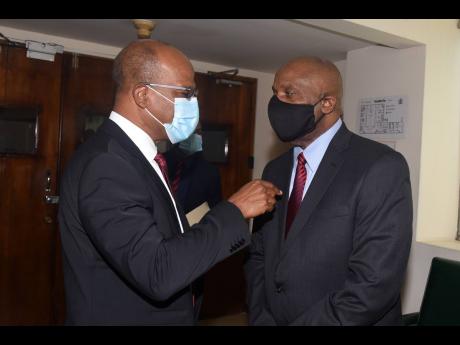Emergency contracts come under more scrutiny
Nearly a decade ago, Greg Christie, in his then capacity of contractor general, made a far-reaching recommendation in the 2011 annual report of the Office of the Contractor General for the “illegitimate abuse of the ‘Government’s emergency contracting facility’” to be halted.
To date, the recommendation has not been accepted, but on Tuesday, a lawmaker drew reference to the proposal, saying the process is abused by many government agencies and public bodies.
Peter Bunting, member of the Integrity Commission Oversight Committee (ICOC), argued that the abuse of the emergency contracting process was an indicator that “something untoward” was taking place.
“When you look at some agencies, 80 per cent, or the vast majority of the contracts awarded, is in some way, shape or form direct sourcing.
“It’s such a red flag that I would suggest that special attention is given to publishing these and to draw the public’s attention (to them),” Bunting suggested to the directors of the Integrity Commission who appeared before the oversight committee on Tuesday.
He contended that the publishing of emergency contracts on the website of the Integrity Commission would help to serve as a deterrent to those government agencies and public bodies that have been abusing the process.
“It would be a powerful deterrent in real time if you were doing it quarterly because so soon as they are making the decision they know that it is going to be exposed shortly,” he added.
With Section 6 of the Integrity Commission Act giving members of the committee latitude to make recommendations to the anti-corruption body, Bunting encouraged the agency’s Executive Director Greg Christie to consider the proposal.
Christie indicated that the commission would not only accept the recommendation to highlight emergency contracts, but would also place on its website government lands that are being divested by the State.
The executive director of the Integrity Commission shared with members of the ICOC his recommendations in 2011, many of which have been seemingly ignored by respective administrations.
EXPUNGE SPECIFIC RULES
In his capacity of then contractor general, Christie recommended that the ‘Government’s conflict of interest rules’ be enforced and sanctions imposed for their violation.
He called for the expungement from the Government’s Procurement Rules the concept of ‘the unsolicited proposal’ on the “grounds that same is a corruption-enabling device which can be clandestinely utilised by corrupt politicians and public officials to corruptly direct lucrative state contracts to a preferred or connected contractor in consideration for a ‘kickback’”.
In 2011, Christie also recommended the development and implementation of a comprehensive and overriding policy to be applicable to all public body boards to govern, restrict, or prohibit, as the case may be, the award of government contracts (or the divestment of publicly owned assets), by a public body, to members of their respective board of directors, or to any entity in which a board member or a close family relative may have a pecuniary interest.

